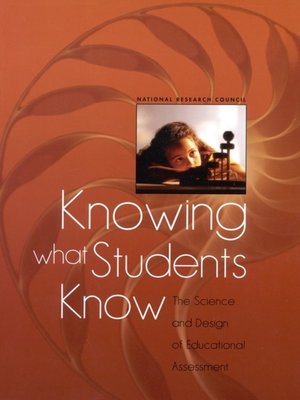Knowing What Students Know
ebook ∣ The Science and Design of Educational Assessment
By National Research Council

Sign up to save your library
With an OverDrive account, you can save your favorite libraries for at-a-glance information about availability. Find out more about OverDrive accounts.
Find this title in Libby, the library reading app by OverDrive.



Search for a digital library with this title
Title found at these libraries:
| Library Name | Distance |
|---|---|
| Loading... |
Education is a hot topic. From the stage of presidential debates to tonight's dinner table, it is an issue that most Americans are deeply concerned about. While there are many strategies for improving the educational process, we need a way to find out what works and what doesn't work as well. Educational assessment seeks to determine just how well students are learning and is an integral part of our quest for improved education.
The nation is pinning greater expectations on educational assessment than ever before. We look to these assessment tools when documenting whether students and institutions are truly meeting education goals. But we must stop and ask a crucial question: What kind of assessment is most effective?
At a time when traditional testing is subject to increasing criticism, research suggests that new, exciting approaches to assessment may be on the horizon. Advances in the sciences of how people learn and how to measure such learning offer the hope of developing new kinds of assessments-assessments that help students succeed in school by making as clear as possible the nature of their accomplishments and the progress of their learning.
Knowing What Students Know essentially explains how expanding knowledge in the scientific fields of human learning and educational measurement can form the foundations of an improved approach to assessment. These advances suggest ways that the targets of assessment-what students know and how well they know it-as well as the methods used to make inferences about student learning can be made more valid and instructionally useful. Principles for designing and using these new kinds of assessments are presented, and examples are used to illustrate the principles. Implications for policy, practice, and research are also explored.
With the promise of a productive research-based approach to assessment of student learning, Knowing What Students Know will be important to education administrators, assessment designers, teachers and teacher educators, and education advocates.
The nation is pinning greater expectations on educational assessment than ever before. We look to these assessment tools when documenting whether students and institutions are truly meeting education goals. But we must stop and ask a crucial question: What kind of assessment is most effective?
At a time when traditional testing is subject to increasing criticism, research suggests that new, exciting approaches to assessment may be on the horizon. Advances in the sciences of how people learn and how to measure such learning offer the hope of developing new kinds of assessments-assessments that help students succeed in school by making as clear as possible the nature of their accomplishments and the progress of their learning.
Knowing What Students Know essentially explains how expanding knowledge in the scientific fields of human learning and educational measurement can form the foundations of an improved approach to assessment. These advances suggest ways that the targets of assessment-what students know and how well they know it-as well as the methods used to make inferences about student learning can be made more valid and instructionally useful. Principles for designing and using these new kinds of assessments are presented, and examples are used to illustrate the principles. Implications for policy, practice, and research are also explored.
With the promise of a productive research-based approach to assessment of student learning, Knowing What Students Know will be important to education administrators, assessment designers, teachers and teacher educators, and education advocates.







